Fleurs du Mal Magazine


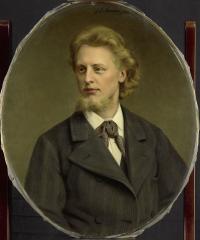
Die lach
Zooals wanneer opeens de zonneschijn
Door ‘t zwart der breede wolken heen komt breken,
En schittert in de tranen, die er leken
Van blad en bloem, als vloeiend kristallijn,
Zóó, dat het weenen lachen schijnt te zijn:
Zoo is, wat mij ontstemt, opeens geweken,
Mathilde! ontsluit úw mond zich om te spreken,
En doolt een glimlach om uw lippen, fijn: –
Doch van den lach is glimlach dageraad,
En klinkt uw lach, hoe drinken hem mijne ooren!
De vreugde vaart door pols en vezel rond. –
En met geloken oog zie ‘k uw gelaat,
Zoo zonnig: ‘k meen uw zilvren lach te hooren,
Wanneer ik roerloos wacht op de’ uchtendstond….
Jacques Perk
(1859 – 1881)
Die lach
• fleursdumal.nl magazine
More in: Archive O-P, Archive O-P, CLASSIC POETRY, Jacques Perk
1946. De jonge Franse Mathilde valt als een blok voor Amine, een Marokkaanse officier in dienst van het Franse leger.
Ze trouwen en vertrekken naar zijn familieboerderij in een klein dorpje, uren rijden van Rabat.
De liefde wordt constant op de proef gesteld maar houdt stand en ze krijgen een dochter, Aïcha, en een zoon, Selim.
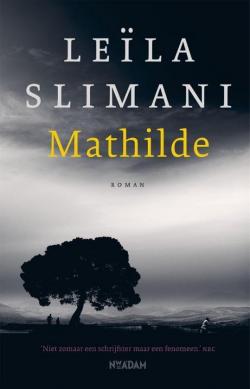 Mathilde vecht tegen de armoede en het heersende patriarchaat, soms met succes. Zo ontwikkelt ze zich tot dokter voor de plattelandsbevolking. Dit kleurrijke familieverhaal speelt zich af tegen de achtergrond van een steeds grimmiger wordende onafhankelijkheidsstrijd van protectoraat Marokko tegen Frankrijk, waarin Mathilde en Amine geen partij willen kiezen. Maar dan komt de dag dat de strijd ook hun afgelegen streek bereikt.
Mathilde vecht tegen de armoede en het heersende patriarchaat, soms met succes. Zo ontwikkelt ze zich tot dokter voor de plattelandsbevolking. Dit kleurrijke familieverhaal speelt zich af tegen de achtergrond van een steeds grimmiger wordende onafhankelijkheidsstrijd van protectoraat Marokko tegen Frankrijk, waarin Mathilde en Amine geen partij willen kiezen. Maar dan komt de dag dat de strijd ook hun afgelegen streek bereikt.
Mathilde is het eerste deel van de trilogie Het land van de anderen. Het verhaal is gebaseerd op Slimani’s eigen familiegeschiedenis, met een oma uit de Elzas, een opa uit Marokko, en een moeder die opgroeide op het arme boerenbedrijf van haar ouders maar toch de eerste vrouwelijke gynaecoloog van Marokko werd.
Leïla Slimani (Marokko, 1981) studeerde politicologie en handelswetenschappen in Frankrijk. Voor De perfecte oppas (eerder: Een zachte hand) won ze de Prix Goncourt. Het boek werd verfilmd onder de titel Chanson douce. Ook haar debuut In de tuin van het beest werd een wereldwijde bestseller. Seks en leugens, een bundel met openhartige interviews over de hypocriete seksuele moraal in Marokko, werd genomineerd voor de Prix Renaudot. In Marokko deed ze afstand van haar auteursrechten hierop om het boek betaalbaar te maken voor Marokkaanse vrouwen. Slimani wil een bijdrage leveren aan de ontwikkeling van een vrije samenleving met gelijke rechten voor vrouwen en mannen. Sinds 2017 is ze daarnaast persoonlijk vertegenwoordiger voor President Macron voor de Francofonie. Mathilde is het eerste deel van de trilogie Het land van de anderen. Het verhaal is gebaseerd op haar familiegeschiedenis en kwam in Frankrijk op één binnen in de bestsellerlijst.
Het land van de anderen – Mathilde roman
Auteur: Leïla Slimani
Serie: Het Land Van De Anderen
Taal: Nederlands
Bindwijze: Hardcover
22,99 euro
Druk 1
Verschijningsdatum: juni 2020
Afmetingen 21,6 x 14,4 x 3 cm
Aantal pagina’s: 356 pagina’s
Uitgever: Nieuw Amsterdam
Vertaald door Gertrud Maes Gertrud Maes
EAN 9789046827000
NUR code 302
Subtitel: roman
Categorieën: Literatuur & Romans/ Familieromans/ Literaire romans
# new books
Leïla Slimani
Mathilde roman
• fleursdumal.nl magazine
More in: - Book News, - Book Stories, Archive S-T, Leïla Slimani
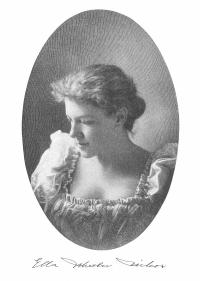
A Dream
In the night I dreamed that you had died,
And I thought you lay in your winding sheet;
And I kneeled low by your coffin side,
With my cheek on your heart that had ceased to beat.
And I thought as I looked on your form so still,
A terrible woe, and an awful pain,
Fierce as vultures that slay and kill,
Tore at my bosom and maddened my brain.
And then it seemed that the chill of death
Over me there like a mantle fell,
And I knew by my fluttering, failing breath
That the end was near, and all was well.
I woke from my dream in the black midnight –
It was only a dream at worst or best –
But I lay and thought till the dawn of light,
Had the dream been true we had both been blest.
Better to kneel by your still dead form,
With my cheek on your breast, and die that way,
Than to live and battle with night and storm,
And drift away from you day by day.
Better the anguish of death and loss,
The sharp, quick pain, and the darkness, then,
Than living on with this heavy cross
To bear about in the world of men.
Ella Wheeler Wilcox
(1855 – 1919)
A Dream (Poem)
• fleursdumal.nl magazine
More in: Archive W-X, Archive W-X, CLASSIC POETRY, Wheeler Wilcox, Ella

Nasrin Sotoudeh and her son
In prisons across Iran, there have been people who have tested positive for COVID-19. This raises grave concerns for prisoners in Iran, including human rights lawyer and prisoner of conscience Nasrin Sotoudeh. Take action and demand she is released now.
After two grossly unfair trails, Nasrin Sotoudeh, a prominent Iranian human rights lawyer, was sentenced to 38 years and six months in prison and 148 lashes because of her work defending women’s rights and protesting against Iran’s discriminatory and degrading forced veiling laws. Nasrin has dedicated her life to peaceful human rights works.
Now, in prisons across Iran, there have been confirmed cases of COVID-19. This raises grave fears that prisoners, like Nasrin, are at risk of contracting the virus. Prisoners are at particular risk because they are unable to take the same social distancing and hygiene measures as those outside of prison to protect themselves.
 Across Iran, prisoners have pleaded with officials to address overcrowded, unhygienic and unsanitary conditions that put them at greater risk of COVID-19 infections, raising alarms about the authorities’ failure to sufficiently protect prison populations from the spread of the virus. Some prisoners have been denied adequate medical care, leaving them at greater risk from the virus if contracted.
Across Iran, prisoners have pleaded with officials to address overcrowded, unhygienic and unsanitary conditions that put them at greater risk of COVID-19 infections, raising alarms about the authorities’ failure to sufficiently protect prison populations from the spread of the virus. Some prisoners have been denied adequate medical care, leaving them at greater risk from the virus if contracted.
Nasrin is among the hundreds of prisoners of conscience jailed in Iran. No one should spend a single day in prison for peacefully exercising their rights.
Call on the Supreme Leader of Iran to release Nasrin Sotoudeh immediately and unconditionally and for her sentences to be quashed without delay.
Iran: Free Nasrin Sotoudeh
Link: action amnesty international
• fleursdumal.nl magazine
More in: AUDIO, CINEMA, RADIO & TV, MUSEUM OF PUBLIC PROTEST, PRESS & PUBLISHING, REPRESSION OF WRITERS, JOURNALISTS & ARTISTS
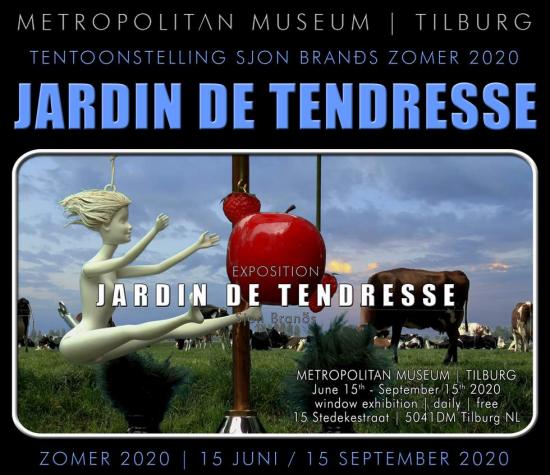
‘Jardin de Tendresse’ (Tuin der Tederheid) in het ‘Metropolitan Museum Tilburg’
De raamtentoonstellingen aan de Stedekestraat (‘Metropolitan Museum Tilburg’) laten deze zomer een ‘tuin der tederheid’ zien, waarmee het museum wederom reageert op deze donkere tijden van corona. Te zien vanaf vrijdagavond 12 juni 2020, Stedekestraat 15 te Tilburg.
De ‘anderhalvemetersamenleving’, ze is er dan toch van gekomen. Afstand als nieuwe normaal. Wie had dat ooit kunnen denken? Geen hand meer reiken om de ander vriendelijk te begroeten? Geen spontane omhelzingen meer met vrienden en vriendinnen? Geen knuffels meer aan kinderen en kleinkinderen? Niet meer zoenen op het zebrapad? Nooit meer vrijen op het strand? Waar leven we nog voor? Veiligheid voor alles? Echt waar? Gelamineerd door het leven en virtuele gemeenschap?
“Alles van waarde is weerloos,” schreef de dichter Lucebert, meteen gevolgd door de magistrale regel: “wordt van aanraakbaarheid rijk en aan alles gelijk!” Aanraking, hoe lang kan een mens zonder? Zonder af te glijden naar een troosteloos robottenbestaan? Waar gaan we heen?
Vandaar een tentoonstelling. Heeft kunst tenminste nog enige zin in deze donkere dagen. En dus nodigen wij u met alle plezier uit voor de expositie ‘Jardin de Tendresse’ (‘Tuin der Tederheid’) van Sjon Brands. Een speelse ‘exposition dansante’, uitgevoerd in bewegende assemblages van alledaagse gebruiksvoorwerpen en speelgoed. Een onbevangen feest van aanraking, tederheid en kwetsbaarheid, te zien in het ‘Metropolitan Museum Tilburg’. Welkom! Komt dat zien! Dag en nacht, zeven dagen in de week! Reserveren niet nodig.
◊ Dorith van der Lee
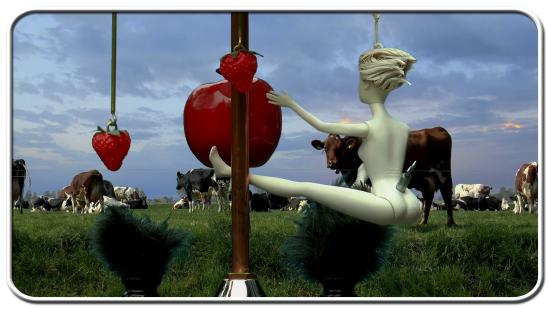
Raamtentoonstelling Sjon Brands:
‘Jardin de Tendresse’ (‘Tuin der Tederheid’)
vrijdag 12 juni t/m 15 september 2020
dagelijks, dag en nacht, toegang vrij
‘Metropolitan Museum Tilburg’
Stedekestraat 15, 5041DM Tilburg
website: www.metropolitanmuseum.nl
• fleursdumal.nl magazine
More in: - Objets Trouvés (Ready-Mades), Art & Literature News, Brands, Sjon, Exhibition Archive, Metropolitan Museum Tilburg, Sculpture, Sjon Brands, Surrealism, SURREALISM, Surrealisme, Theater van de Verloren Tijd
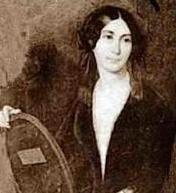
Amour de jeune fille
Ma mère, quel beau jour ! tout brille, tout rayonne.
Dans les airs, l’oiseau chante et l’insecte bourdonne ;
Les ruisseaux argentés roulent sur les cailloux,
Les fleurs donnent au ciel leur parfum le plus doux.
Le lis s’est entr’ouvert ; la goutte de rosée,
Sur les feuilles des bois par la nuit déposée,
S’enfuyant à l’aspect du soleil et du jour,
Chancelle et tombe enfin comme des pleurs d’amour.
Les fils blancs et légers de la vierge Marie,
Comme un voile d’argent, volent sur la prairie :
Frêle tissu, pour qui mon souffle est l’aquilon,
Et que brise en passant l’aile d’un papillon.
Sous le poids de ses fruits le grenadier se penche,
Dans l’air, un chant d’oiseau nous vient de chaque branche ;
Jusqu’au soir, dans les cieux, le soleil brillera :
Ce jour est un beau jour !… Oh ! bien sûr, il viendra !
Il viendra… mais pourquoi ?… Sait-il donc que je l’aime ?
Sait-il que je l’attends, que chaque jour de même,
— Que ce jour soit celui d’hier ou d’aujourd’hui —
J’espère sa présence et ne songe qu’à lui ?
Oh ! non ! il ne sait rien. Qu’aurait-il pu comprendre !…
Les battements du cœur se laissent-ils entendre ?
Les yeux qu’on tient baissés, ont-ils donc un regard ?
Un sourire, dit-il qu’on doit pleurer plus tard ?
Que sait-on des pensers cachés au fond de l’âme !
La douleur qu’on chérit, le bonneur que l’on blâme ,
Au bal, qui les trahit ?… Des fleurs sont sur mon front,
À tout regard joyeux mon sourire répond ;
Je passe auprès de lui sans détourner la tête,
Sans ralentir mes pas…. et mon cœur seul s’arrête.
Mais qui peut voir le cœur ? qu’il soit amour ou fiel,
C’est un livre fermé, qui ne s’ouvre qu’au ciel !
Une fleur est perdue, au loin, dans la prairie,
Mais son parfum trahit sa présence et sa vie ;
L’herbe cache une source, et le chêne un roseau,
Mais la fraîcheur des bois révèle le ruisseau ;
Le long balancement d’un flexible feuillage
Nous dit bien s’il reçoit ou la brise ou l’orage ;
Le feu qu’ont étouffé des cendres sans couleur,
Se cachant à nos yeux, se sent par la chaleur ;
Pour revoir le soleil quand s’enfuit l’hirondelle,
Le pays qu’elle ignore est deviné par elle :
Tout se laisse trahir par l’odeur ou le son,
Tout se laisse entrevoir par l’ombre ou le rayon,
Et moi seule, ici-bas, dans la foule perdue,
J’ai passé près de lui sans qu’il m’ait entendue…
Mon amour est sans voix, sans parfum, sans couleur,
Et nul pressentiment n’a fait battre son cœur !
Ma mère, c’en est fait ! Le jour devient plus sombre ;
Aucun bruit, aucun pas, du soir ne trouble l’ombre.
Adieux à vous ! — à vous, ingrat sans le savoir !
Vous, coupable des pleurs que vous ne pouvez voir !
Pour la dernière fois, mon Ame déchirée
Rêva votre présence, hélas! tant désirée…
Plus jamais je n’attends. L’amour et l’abandon,
Du cœur que vous brisez les pleurs et le pardon,
Vous ignorerez tout !… Ainsi pour nous, un ange.
Invisible gardien, dans ce monde où tout change.
S’attache à notre vie et vole à nos côtés ;
Sous son voile divin nous sommes abrités,
Et jamais, cependant, on ne voit l’aile blanche
Qui, sur nos fronts baissés, ou s’entrouvre ou se penche.
Dans les salons, au bal, sans cesse, chaque soir,
En dansant près de vous, il me faudra vous voir ;
Et cependant, adieu… comme à mon premier rêve !
Tous deux, à votre insu, dans ce jour qui s’achève,
Nous nous serons quittés ! — Adieu, soyez heureux !…
Ma prière, pour vous, montera vers les Cieux :
Je leur demanderai qu’éloignant les orages,
Ils dirigent vos pas vers de riants rivages,
Que la brise jamais, devenant aquilon,
D’un nuage pour vous ne voile l’horizon ;
Que l’heure à votre gré semble rapide ou lente ;
Lorsque vous écoutez, que toujours l’oiseau chante ;
Lorsque vous regardez, que tout charme vos yeux,
Que le buisson soit vert, le soleil radieux ;
Que celle qui sera de votre cœur aimée,
Pour vous, d’un saint amour soit toujours animée !…
— Si parfois, étonné d’un aussi long bonheur,
Vous demandez à Dieu : « Mais pourquoi donc, Seigneur ? »
Il répondra peut-être : « Un cœur pour toi me prie…
Et sa part de bonheur, il la donne à ta vie ! »
Sophie d’Arbouville
(1810-1850)
Amour de jeune fille
Poésies et nouvelles (1840)
• fleursdumal.nl magazine
More in: Arbouville, Sophie d', Archive A-B, Archive A-B
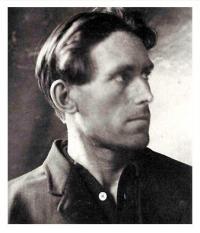
Where the Fraser River Flows
(Tune: “Where the River Shannon Flows”)
Fellow workers pay attention to what I’m going to mention,
For it is the fixed intention of the Workers of the World.
And I hope you’ll all be ready, true-hearted, brave and steady,
To gather ’round our standard when the Red Flag is unfurled.
CHORUS
Where the Fraser river flows, each fellow worker knows,
They have bullied and oppressed us, but still our Union grows.
And we’re going to find a way, boys, for shorter hours and better pay, boys;
And we’re going to win the day, boys; where the river Fraser flows.
For the gunny-sack contractors have all been dirty actors,
And they’re not our benefactors, each fellow worker knows.
So we’ve got to stick together in fine or dirty weather,
And we will show no white feather, where the Fraser river flows.
New the boss the law is stretching, bulls and pimps he’s fetching,
And they are a fine collection, as Jesus only knows.
But why their mothers reared them, and why the devil spared them,
Are questions we can’t answer, where the Fraser river flows.
Why should any worker be without the necessities of life when ten men can produce enough for a hundred?
Joe Hill
(1879-1915)
Where the Fraser River Flows
(song)
Songs of the Workers (15th edition) (1919)
Industrial Workers of the World
Where the Fraser River Flows by Joe Hill (uncredited). Onward, “One Big Union!”
The tune to this song, “Where the River Shannon Flows” (1906) written by James J. Russell.
• fleursdumal.nl magazine
More in: # Music Archive, Archive G-H, Joe Hill, Workers of the World
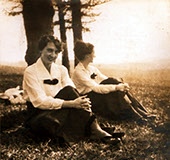
The Poet’s Thrift
My landscape only need comprise low hills,
For these are eminent and limitless
To me. They mean more than my dreams express;
They mean more than my word or deed fulfils.
The slender trees, the tuneless whip-poor-wills,
Impart quite ample themes to loneliness.
I find enough in scant elusiveness
Of springs and little brooks. My spirit thrills
To beauty, unprepared for the sublime.
I wonder, though, when I shall be completed
Even to transcribe these hills? Sometime
This landscape in few lines will show to me
The subtle mysteries I have entreated,
In the simple realm of poetry.
Gladys Cromwell
(1885-1919)
The Poet’s Thrift
From: Songs of the Dust, 1915
• fleursdumal.nl magazine
More in: Archive C-D, Cromwell, Gladys, Gladys Cromwell
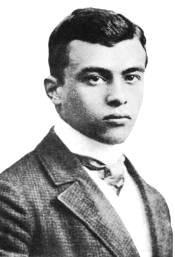
Der Todesengel
I
Mit Trommelwirbeln geht der Hochzeitszug,
in seidner Sänfte wird die Braut getragen,
durch rote Wolken weißer Rosse Flug,
die ungeduldig goldne Zäume nagen.
Der Todesengel harrt in Himmelshallen
als wüster Freier dieser zarten Braut.
Und seine wilden, dunklen Haare fallen
die Stirn hinab, auf der der Morgen graut.
Die Augen weit, vor Mitleid glühend offen
wie trostlos starrend hin zu neuer Lust,
ein grauenvolles, nie versiegtes Hoffen,
ein Traum von Tagen, die er nie gewußt.
II
Er kommt aus einer Höhle, wo ein Knabe
ihn als Geliebte wunderzart umfing.
Er flog durch seinen Traum als Schmetterling
und ließ ihn Meere sehn als Morgengabe.
Und Lüfte Indiens, wo an Fiebertagen
das greise Meer in gelbe Buchten rennt.
Die Tempel, wo die Priester Zimbeln schlagen,
um Öfen tanzend, wo ein Mädchen brennt.
Sie schluchzt nur leise, denn der Schar Gesinge
zeigt ihr den Götzen, der auf Wolken thront
und Totenschädel trägt als Schenkelringe,
der Flammenqual mit schwarzen Küssen lohnt.
Betrunkne tanzen nackend zwischen Degen,
und einer stößt sich in die Brust und fällt.
Und während blutig sich die Schenkel regen,
versinkt dem Knaben Tempel, Traum und Welt.
III
Dann flog er hin zu einem alten Manne
und kam ans Bett als grüner Papagei.
Und krächzt das Lied: »O schmähliche Susanne!«
Die längst vergessne Jugendlitanei.
Der stiert ihn an. Aus Augen glasig blöde
blitzt noch ein Strahl. Ein letztes böses Lächeln
zuckt um das zahnlose Maul. Des Zimmers Öde
erschüttert jäh ein lautes Todesröcheln.
IV
Die Braut friert leise unterm leichten Kleide.
Der Engel schweigt. Die Lüfte ziehn wie krank.
Er stürzt auf seine Knie. Nun zittern beide.
Vom Strahl der Liebe, der aus Himmeln drang.
Posaunenschall und dunkler Donner lachen.
Ein Schleier überflog das Morgenrot.
Als sie mit ihrer zärtlichen und schwachen
Bewegung ihm den Mund zum Küssen bot.
Jakob van Hoddis
(1887 – 1942)
Der Todesengel (Gedicht)
• fleursdumal.nl magazine
More in: Archive G-H, Archive G-H, Hoddis, Jakob van
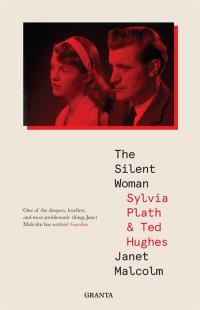 The Silent Woman is a brilliant, elegantly reasoned meditation on the nature of biography.
The Silent Woman is a brilliant, elegantly reasoned meditation on the nature of biography.
Janet Malcolm (author of Reading Chekhov, The Journalist and the Murderer, In the Freud Archives) examines the biographies of Sylvia Plath, with particular focus on Anne Stevenson’s controversial Bitter Fruit, to discover how Plath became the enigma of literary history, and how the legend continues to exert such a hold on our imaginations.
Janet Malcolm‘s books include Reading Chekhov, In the Freud Archives, The Silent Woman: Sylvia Plath and Ted Hughes and Psychoanalysis: The Impossible Profession. Born in Prague, she grew up in New York, where she now lives.
“One of the deepest, loveliest, and most problematic things Janet Malcolm has written. It is so subtle, so patiently analytical, and so true that it is difficu’lt to envisage anyone writing again about Plath and Hughes.” Guardian
The Silent Woman
by Janet Malcolm
Published: 02/04/2020
ISBN: 9781783786237
Granta Books
224 pages
Paperback
£10
# more biographies
• fleursdumal.nl magazine
More in: #Biography Archives, - Book News, - Book Stories, Archive M-N, Sylvia Plath
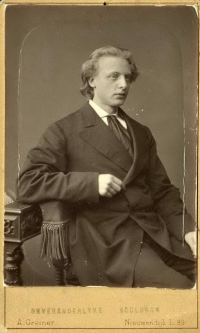
Zij komt
Gij, berken, buigt uw ranke loovertrossen!
Strooit, rozen, op het zand èn sneeuw èn blad!
Gij, zwaatlende olmen, nijgt u naar het pad,
En kust den dauw van sidderende mossen!
En, snelgewiekte liederen der bosschen,
Stemt aan én zang én lof! En, klimveil, dat
Den slanken, diepbeminden beuk omvat,
Druk hechter aan de twijgen u, de rossen!
Voorzegger, die uzelven roept, o kom,
En roep uw koekkoek duizend blijde keeren,
En fladder aan, vergulde vlinderdrom!
Zij zweeft hierheen, die zon en zomer eeren:
De lof van hare schoonheid klinke alom,
Waar zon en zomer te beminnen leeren!
Jacques Perk
(1859 – 1881)
Zij komt
• fleursdumal.nl magazine
More in: Archive O-P, CLASSIC POETRY, Jacques Perk

Laat hier jouw stem voor cultuur horen!
• fleursdumal.nl magazine
More in: - Book Lovers, Art & Literature News, AUDIO, CINEMA, RADIO & TV, DANCE & PERFORMANCE, Design, Fashion, Graffity, Illustrators, Illustration, LITERARY MAGAZINES, MUSIC, THEATRE
Thank you for reading Fleurs du Mal - magazine for art & literature